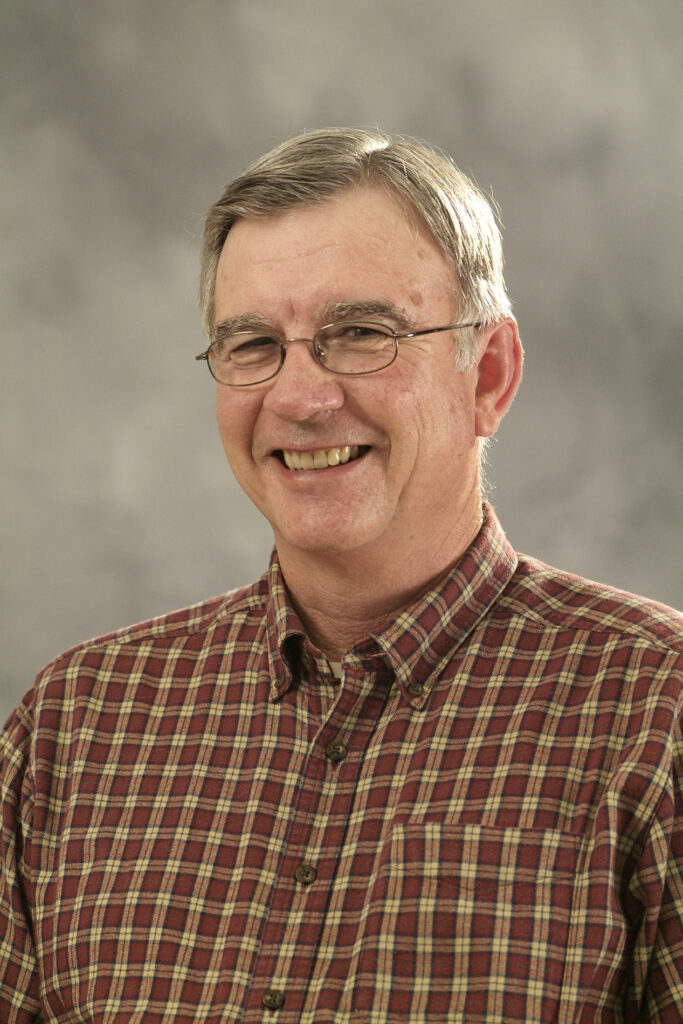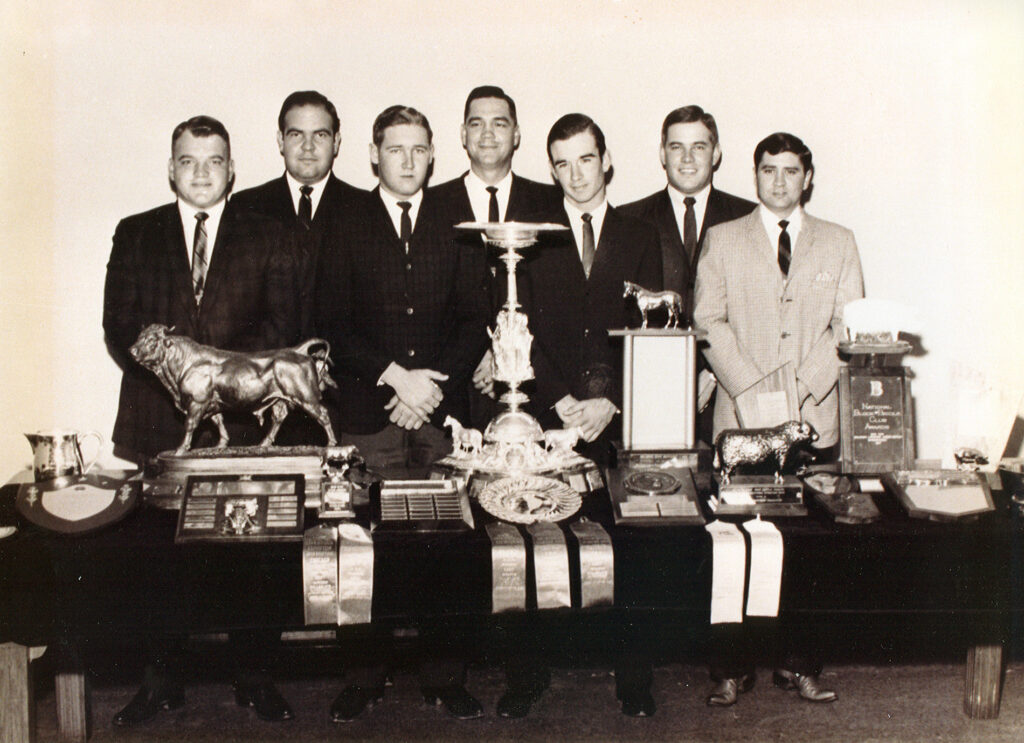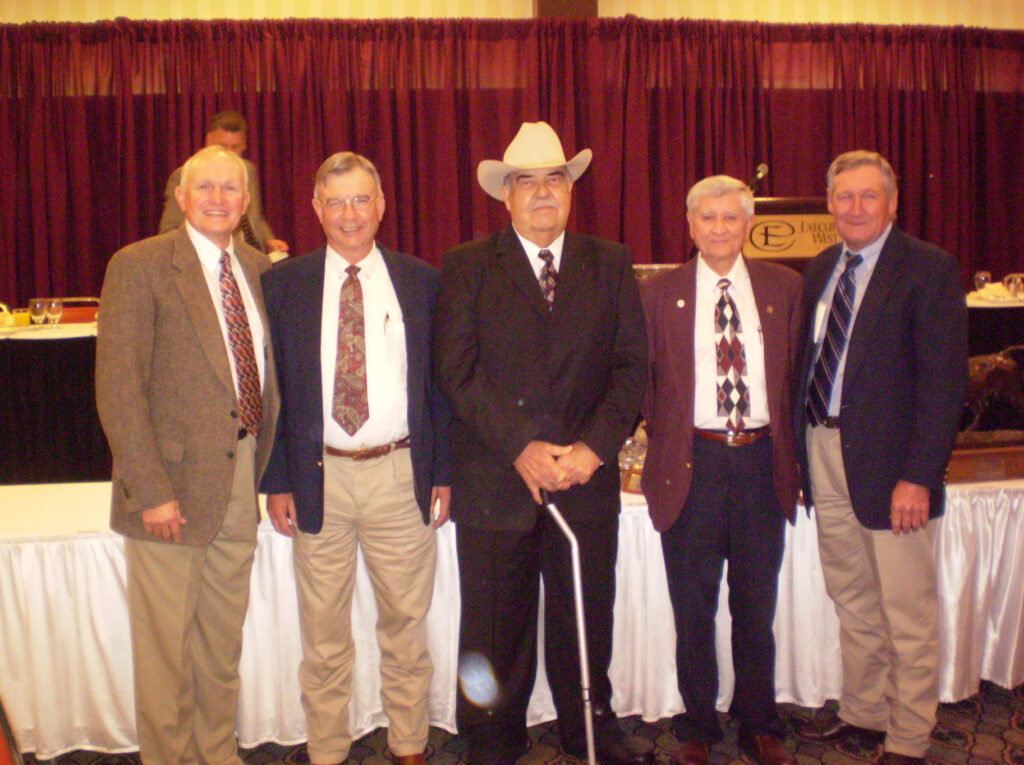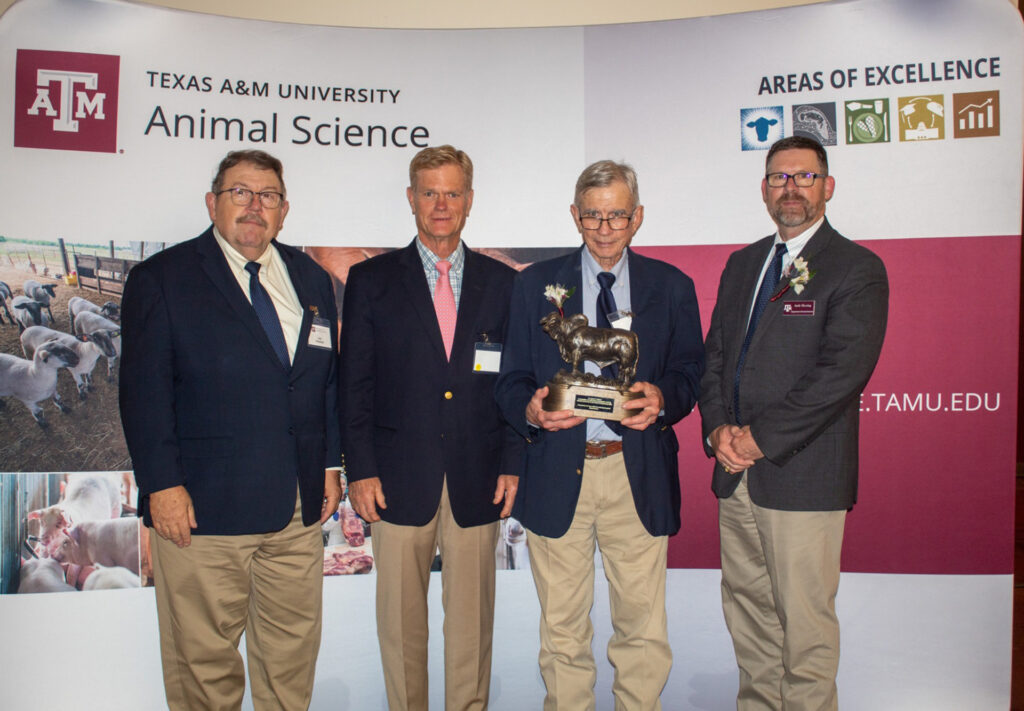After 50 years, Texas A&M animal science legend says farewell
Jim Sanders: teacher, researcher, livestock judge
Jim Sanders ’74 ‘77, Ph.D., senior professor of animal breeding and genetics, may be retiring, but he will continue to make waves in the livestock industry for many more years to come for two reasons – his love for his students and their respect for him.

An Aggie through and through, Sanders completed all three degrees at Texas A&M University before joining the animal breeding and genetics section of the College of Agriculture and Life Sciences Department of Animal Science as a faculty member.
Except for four years while working for a ranch immediately after graduation, serving in the Army, and back at the same ranch, he has been a part of the Department of Animal Science since 1964, when he started his bachelor’s degree, for a total of about 55 years. He earned his bachelor’s, master’s and doctorate degrees there. Since joining the department faculty in 1974, he has touched the lives of an estimated 10,000 students.
The students were his passion
“I love the students, love the interaction with them, and some of my best friends are people I taught as students,” Sanders said. “Two of my colleagues today were my students. It’s been my life, and it’s really been good.
“From the first time I taught the animal breeding class, students from that class have been close friends. Students who worked in the class as graduate student assistants are now co-workers,” he said. “If I tried to name them, the list would go on and on of the students who have been a major part of my life. I also had the privilege of teaching my own son, one of the 10,000 or so students I have taught.”
And now he is proud to say that one of his grandsons, Owen Sanders, will start at Texas A&M in the fall as a freshman in animal science, making three generations in the animal science department.
“That’s kind of special to me,” he said.
Sanders taught undergraduate courses on animal breeding, livestock breeds, beef cattle production and livestock judging as well as graduate courses in quantitative genetics, animal breeding and beef cattle production.
Sanders, and many of his students, will tell you he was known, even with all his large classes, for his long-answer essay question tests – and he’s proud to say he read and graded every one of them. That’s one of the ways he got to know his students.
Building a research legacy
But Sanders wasn’t just a teacher. He had a tremendous impact on the beef cattle industry with his research on system analysis of beef cattle production, comparisons of cattle breeds for birth, growth, carcass and cow productivity traits, and hybrid vigor retention in composite breeds.
Sanders’ research included the evaluation of genetic change within cattle breeds, evaluation of hybrid vigor retention in Bos indicus/Bos taurus crossbred cattle, identification of genes with major effects on birth, growth, carcass, disposition and cow productivity traits in beef cattle, and the Brahman breed’s genetic history.
He was responsible for designing, conducting and completing the Zebu Breed Evaluation Project that evaluated five Bos indicus breeds as half-blood crosses, including the gray and red Brahman plus Gir, Indu-Brazil and Nellore breeds. This project went on for over 20 years. It evaluated the growth and carcass merit of these breeds as well as the maternal ability and longevity. It was the biggest crossbreeding project at the time and is often still cited by others.
Through the years of his research, Sanders traveled and observed livestock production in Mexico, Belize, Costa Rica, Panama, St. Croix, Brazil, Argentina, Botswana, South Africa, Kenya, Colombia, Zimbabwe, Thailand, Canada, Paraguay, Guatemala and Australia.
Making a name in the livestock judging arena
Sanders said he has judged almost all the breeds of beef cattle at one time or another, judging shows in Texas, Louisiana, Mississippi, Alabama, Florida, Maryland, Arkansas, Missouri, Kentucky, Oklahoma, New Mexico, Arizona, California, Belize, Costa Rica, Panama, Colombia, Mexico, Ecuador, Brazil, Australia, Guatemala and Thailand.

He coached a national champion 4-H livestock judging team and a national champion intercollegiate livestock judging team.

When Sanders lists the highlights of his career, he starts with being a member of the winning team and second high individual of the International Collegiate Meats Judging Contest in 1966 and a member of the winning team, fourth high individual and high individual in reasons of the International Collegiate Livestock Judging Contest in 1967 as a student. And then he highlights “co-coaching” with Sam Jackson the winning team at the International Collegiate Livestock Judging Contest in 1987.
And he talks about the Michaelis Ranch in Kyle, where he spent a couple of summers during college and a year after earning his bachelor’s degree and another year after his stint in the Army. There, he fed, fitted and showed the Reserve Grand Champion Charolais heifer at the National Western and Ft. Worth Southwestern Stock Show, and the Grand Champion heifer at the San Antonio and Houston livestock shows in 1969.
“Those experiences, showing cattle and managing the ranch, are what I loved to do, but I wanted more,” Sanders said. “So, I came back to graduate school, and now I’ve been teaching for over 50 years.”
From students to colleagues to friends
Joe Paschal, Ph.D., retired Texas A&M AgriLife Extension Service beef cattle specialist and now executive vice president of the American Brahman Breeders Association, ABBA, has worked with Sanders in multiple capacities since he was a student to now as they are both still involved in the industry.
“I was very blessed as an undergraduate to have professors who came from farms and ranches; they had lived what they were teaching,” Paschal said. “I first met Dr. Sanders as an undergraduate student in animal science in 1975 when I took Animal Breeding and Genetics, ANSC 305/306. I think most of us were in awe of him. He would barely look at his notes before he began to lecture, and he could write on the board and talk at the same time.”
Paschal said he took two courses under Sanders, and when it came time to get his master’s degree, he asked Sanders to be on his committee.
“He was responsible for my coming back and finishing it and working on and completing my doctorate,” Paschal said. “He was my committee chair, and I taught his animal breeding labs for the next four years.”
Paschal said many colleagues were Sanders’ graduate and undergraduate students, and even his latest hire at the ABBA was one of Sanders’ students.

“His students are located in universities, government agencies and in industry all over the U.S. and in many countries around the world,” Paschal said.
“Dr. Sanders was a consummate teacher who made you want to succeed as a student. He likely is the smartest person I know and probably the best livestock person I have ever known. He was a role model for my own career – ‘don’t just go, spend some time and learn,’ he would say.”
Charles Long, Ph.D., resident director of research and professor at the Texas A&M AgriLife Research and Extension Center at Overton, agreed with Paschal. Long said he’s had the honor and pleasure of having Sanders as a good friend for over 50 years.
“He is one of the most intelligent people I have known,” Long said. “Early in his career, he could discuss the theory and practice of quantitative genetics and animal breeding, including the mathematical and statistical applications, with anyone. Also, he possessed the knowledge and skills to effectively manage a ranch. He is an outstanding teacher of animal breeding, making classes interesting, informative and challenging.”
Long said Sanders’ doctorate research involving response modeling and analysis of beef cattle production systems was original and groundbreaking.
“His genetics research with beef cattle has contributed much to our knowledge base, particularly regarding tropically adapted cattle,” Long said. “He is one of the outstanding faculty members who enhanced the reputation and accomplishments of the Texas A&M University Department of Animal Science.”
The department celebrated Sanders’ service and dedication at an awards banquet on April 28 in College Station. With many former students, colleagues, friends and family members present, Sanders was recognized by Andy Herring, Ph.D., professor and interim department head, as one of the department’s most esteemed members.
“It was an honor learning from Dr. Sanders as a student, and I’ve enjoyed working with him as a colleague for all these years,” Herring said. “We have all learned something from him, and his legacy will continue for many years to come.”
Giving back to students
Sanders and his wife Anne have established a scholarship to be awarded to a student in good standing pursuing an undergraduate degree in animal science in the College of Agriculture and Life Sciences at Texas A&M.
The Anne and Jim Sanders ’68 Endowed Scholarship will be awarded to a student who has a sincere and demonstrated interest in livestock. Recipients will be selected by a committee of faculty and/or staff of the Department of Animal Science.
Anyone who would like to contribute to the Anne and Jim Sanders ’68 Endowed Scholarship can go to Give | Texas A&M Foundation.


